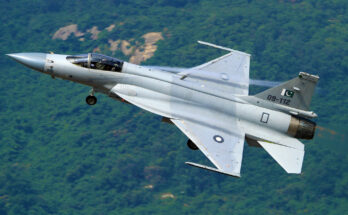Germany’s Defense Minister Annegret Kramp-Karrenbauer announced toPparliament on April 21 the decision to split the replacement program for the Panavia Tornado combat aircraft into two platforms. The long-rumored purchase plans call for the acquisition of 93 Eurofighter Typhoons and 30 Boeing F/A-18E/F Super Hornets, plus 15 Boeing EF-18G Growler electronic warfare aircraft.
With 15 Growlers likely making-up Germany's LuWES electronic attack requirement for NATO, it does actually make sense to get the 30 Super Hornets for the nuclear role to have a combined fleet that's large enough to be viable. Don't think Airbus can be too unhappy with 93 new EFs. https://t.co/JAZozrYnvm
— Gareth Jennings (@GarethJennings3) April 21, 2020
The Eurofighter Typhoon purchase will feature 55 units slated to replace the Tornado, plus 38 additional Typhoons covered under the Quadriga Project meant to phase out older Tranche 1 Eurofighters in the German Air Force fleet with newer models.
The Super Hornets will be used in the nuclear-delivery role currently charged to the Tornado fleet. The Tornado is declared to NATO as a Dual Capable Aircraft (DCA), meaning it may be tasked with the nuclear-delivery role utilizing the B61 nuclear gravity bomb. The EA-18G Growlers, meanwhile, would provide a replacement for the electronic warfare mission-capable Tornado ECR variants. The German Air Force operates around 28 of these platforms.
Germany wants to begin a phased withdrawal of its Tornado fleet in 2025, around which time the newer fighters would ideally begin to arrive. In order to ensure a capability gap does not emerge, the Tornado fleet would continue to serve with the German Air Force until 2030, by which time the new fighters are to become operational.
Was kommt nach dem #Tornado? Der fachliche Vorschlag des Verteidigungsministeriums sieht einen abgewogenen Mix vor, bei dem der Eurofighter das Rückgrat der Luftwaffe bildet, betont Verteidigungsministerin Kramp-Karrenbauer @akk. Die Entscheidung trifft letztlich das Parlament. pic.twitter.com/nOPnEx2WBX
— Verteidigungsministerium (@BMVg_Bundeswehr) April 22, 2020
Reports indicate frustration from the left side of Germany’s political spectrum over the split-buy decision, including from one of the government coalition partners (the Social Democrats) and from the country’s trade unions, which seek priority of local over foreign-sourced orders.
Because of the political controversy related to the split purchase plans, Kramp-Karrenbauer has been careful about saying the Tornado replacement program is a proposal that will only require parliamentary approval by 2022 or 2023 in order to have an order in place by 2025. Thus the metaphorical can (a decision on the split purchase) is being kicked down the road to the next government.

Dan Darling is Forecast International’s director of military and defense markets. In this role, Dan oversees a team of analysts tasked with covering everything from budgeting to weapons systems to defense electronics and military aerospace. Additionally, for over 17 years Dan has, at various times, authored the International Military Markets reports for Europe, Eurasia, the Middle East and the Asia-Pacific region.
Dan's work has been cited in Defense News, Real Clear Defense, Asian Military Review, Al Jazeera, and Financial Express, among others, and he has also contributed commentary to The Diplomat, The National Interest and World Politics Review. He has been quoted in Arabian Business, the Financial Times, Flight International, The New York Times, Bloomberg and National Defense Magazine.
In addition, Dan has made guest appearances on the online radio show Midrats and on The Media Line, as well as The Red Line Podcast, plus media appearances on France 24 and World Is One News (WION).
- Daniel Darling
- Daniel Darling
- Daniel Darling
- Daniel Darling
- Daniel Darling
- Daniel Darling
- Daniel Darling
- Daniel Darling
- Daniel Darling
- Daniel Darling
- Daniel Darling
- Daniel Darling
- Daniel Darling
- Daniel Darling
- Daniel Darling
- Daniel Darling
- Daniel Darling
- Daniel Darling
- Daniel Darling
- Daniel Darling
- Daniel Darling
- Daniel Darling
- Daniel Darling
- Daniel Darling
- Daniel Darling
- Daniel Darling
- Daniel Darling
- Daniel Darling
- Daniel Darling
- Daniel Darling
- Daniel Darling
- Daniel Darling
- Daniel Darling
- Daniel Darling
- Daniel Darling
- Daniel Darling
- Daniel Darling
- Daniel Darling
- Daniel Darling
- Daniel Darling
- Daniel Darling
- Daniel Darling
- Daniel Darling
- Daniel Darling
- Daniel Darling
- Daniel Darling
- Daniel Darling
- Daniel Darling
- Daniel Darling
- Daniel Darling
- Daniel Darling
- Daniel Darling
- Daniel Darling
- Daniel Darling
- Daniel Darling
- Daniel Darling
- Daniel Darling
- Daniel Darling
- Daniel Darling
- Daniel Darling
- Daniel Darling
- Daniel Darling
- Daniel Darling
- Daniel Darling
- Daniel Darling
- Daniel Darling
- Daniel Darling
- Daniel Darling
- Daniel Darling
- Daniel Darling
- Daniel Darling
- Daniel Darling
- Daniel Darling
- Daniel Darling
- Daniel Darling
- Daniel Darling
- Daniel Darling
- Daniel Darling
- Daniel Darling
- Daniel Darling
- Daniel Darling
- Daniel Darling
- Daniel Darling
- Daniel Darling
- Daniel Darling
- Daniel Darling
- Daniel Darling
- Daniel Darling
- Daniel Darling
- Daniel Darling
- Daniel Darling
- Daniel Darling
- Daniel Darling
- Daniel Darling
- Daniel Darling
- Daniel Darling
- Daniel Darling
- Daniel Darling
- Daniel Darling
- Daniel Darling
- Daniel Darling
- Daniel Darling
- Daniel Darling
- Daniel Darling
- Daniel Darling
- Daniel Darling
- Daniel Darling
- Daniel Darling
- Daniel Darling




